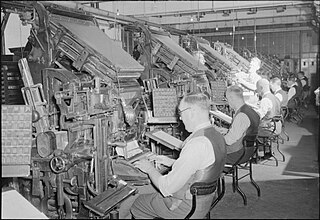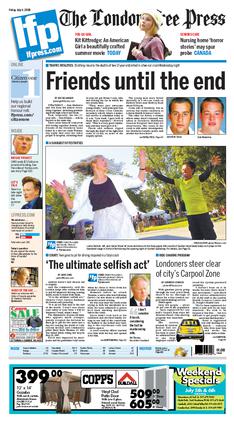
The history of British newspapers begins in the 17th century with the emergence of regular publications covering news and gossip. The relaxation of government censorship in the late 17th century led to a rise in publications, which in turn led to an increase in regulation throughout the 18th century. The Times began publication in 1785 and became the leading newspaper of the early 19th century, before the lifting of taxes on newspapers and technological innovations led to a boom in newspaper publishing in the late 19th century. Mass education and increasing affluence led to new papers such as the Daily Mail emerging at the end of the 19th century, aimed at lower middle-class readers.

The London Evening Standard, formerly The Standard (1827–1904), is a local free daily newspaper in London, England, published Monday to Friday in tabloid format.

The London Free Press is a daily newspaper based in London, Ontario, Canada. It has the largest circulation of any newspaper in Southwestern Ontario.
The Yorkshire Post is a daily broadsheet newspaper, published in Leeds, Yorkshire, England. It primarily covers stories from Yorkshire, although its masthead carries the slogan "Yorkshire's National Newspaper". It was previously owned by Johnston Press and is now owned by National World. Founded in 1754, it is one of the oldest newspapers in the country.

The Sun was a New York newspaper published from 1833 until 1950. It was considered a serious paper, like the city's two more successful broadsheets, The New York Times and the New York Herald Tribune. The Sun was the first successful penny daily newspaper in the United States, and was for a time, the most successful newspaper in America.

The Daily Courant, initially published on 11 March 1702, was the first British daily newspaper. It was produced by Elizabeth Mallet at her premises next to the King's Arms tavern at Fleet Bridge in London. The newspaper consisted of a single page, with advertisements on the reverse side. Mallet advertised that she intended to publish only foreign news and would not add any comments of her own, supposing her readers to have "sense enough to make reflections for themselves".
The history of journalism spans the growth of technology and trade, marked by the advent of specialized techniques for gathering and disseminating information on a regular basis that has caused, as one history of journalism surmises, the steady increase of "the scope of news available to us and the speed with which it is transmitted. Before the printing press was invented, word of mouth was the primary source of news. Returning merchants, sailors, travelers brought news back to the mainland, and this was then picked up by pedlars and traveling players and spread from town to town. Ancient scribes often wrote this information down. This transmission of news was highly unreliable and died out with the invention of the printing press. Newspapers have always been the primary medium of journalists since the 18th century, radio and television in the 20th century, and the Internet in the 21st century.

The Northern Echo is a regional daily morning newspaper based in the town of Darlington in North East England, serving mainly southern County Durham and northern Yorkshire. The paper covers national as well as regional news. In 2007, its then-editor claimed that it was one of the most famous provincial newspapers in the United Kingdom. Its first edition was published on 1 January 1870.
The Westminster Gazette was an influential Liberal newspaper based in London. It was known for publishing sketches and short stories, including early works by Raymond Chandler, Anthony Hope, D. H. Lawrence, Katherine Mansfield, and Saki, and travel writing by Rupert Brooke. One of its editors was caricaturist and political cartoonist Francis Carruthers Gould. The paper was dubbed the "pea-green incorruptible" – Prime Minister William Ewart Gladstone having personally approved its green colour.

The Evening News, earlier styled as The Evening News, and from 1889 to 1894 The Evening News and Post, was an evening newspaper published in London from 1881 to 1980, reappearing briefly in 1987. It became highly popular under the control of the Harmsworth brothers. For a long time it maintained the largest daily sale of any evening newspaper in London. After financial struggles and falling sales, it was eventually merged with its long-time rival the Evening Standard in 1980. The newspaper was revived for an eight-month period in 1987.
Kingston upon Hull, often simply referred to as Hull, was a parliamentary constituency in Yorkshire, electing two members of parliament to the House of Commons of the Parliament of the United Kingdom, from 1305 until 1885. Its MPs included the anti-slavery campaigner, William Wilberforce, and the poet Andrew Marvell.

Sir Edward Hulton, 1st Baronet was a British newspaper proprietor and thoroughbred racehorse owner.
Manchester Evening Chronicle was a newspaper established by Sir Edward Hulton, a Manchester City chairman, a newspaper proprietor and a racehorse owner. It started publication in 1897, was renamed Evening Chronicle in 1914 but stayed in Manchester. It continued publication under various ownerships until 1963, when it was merged with the more successful Manchester Evening News and discontinued publication.

Edward "Ned" Hulton (1838–1904) was a British newspaper proprietor in Victorian Manchester. Born the son of a weaver, he was an entrepreneur who established a vast newspaper empire and was the progenitor of a publishing dynasty.
Sir Richard George Augustus Levinge, 7th Baronet was an Irish landowner and politician from Knockdrin Castle, County Westmeath. He sat in the House of Commons of the United Kingdom from 1857 to 1865.
The history of journalism in the United Kingdom includes the gathering and transmitting of news, spans the growth of technology and trade, marked by the advent of specialised techniques for gathering and disseminating information on a regular basis. In the analysis of historians, it involves the steady increase of the scope of news available to us and the speed with which it is transmitted.
The Sun was a British evening newspaper established by John Heriot in 1792 and was discontinued in 1876. The paper was founded by members of the Tory government led by William Pitt the Younger to counter the contemporary pro-revolutionary press.
Catharine Young was a British journalist. Young was one of the first women to work on the staff of a newspaper, doing so before Eliza Lynn Lynton, who is often given this position.








